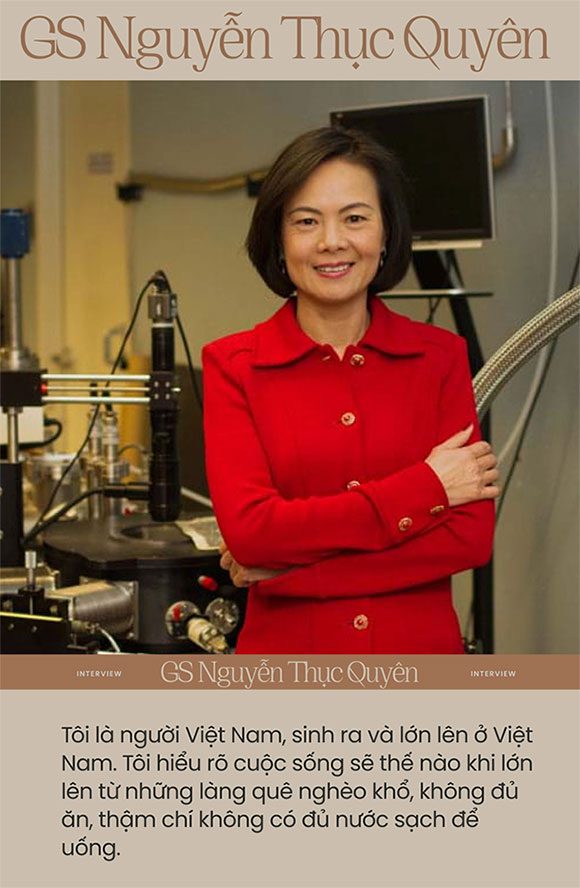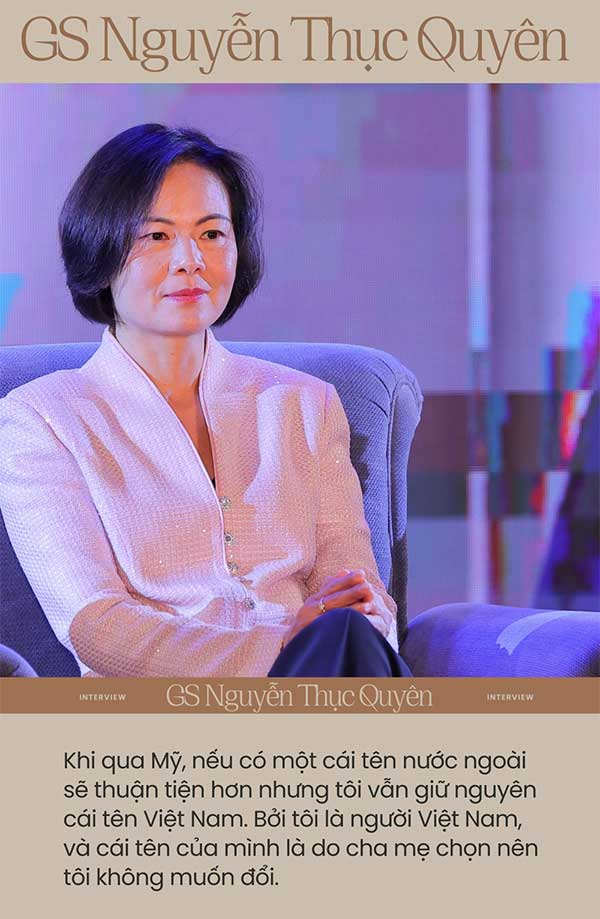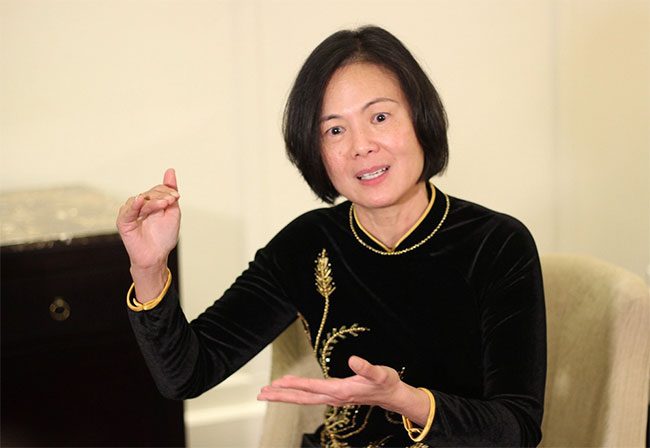The story of Professor Nguyen Thuc Quyen has inspired many young people.
Back in 2015, Professor Nguyen Thuc Quyen made the Vietnamese research community proud when she was honored as one of the most influential scientists in the world. After spending decades living abroad, Professor Quyen returned to Vietnam with a deep concern about how to position Vietnamese science on the global map. In recent years, she has somewhat realized this concern by connecting leading scientists worldwide with Vietnamese researchers.
What is remarkable is that despite working in the seemingly dry and grand field of science, Professor Nguyen Thuc Quyen’s insights are not “esoteric” like her research. Instead, they are down-to-earth and relatable, allowing any young person to see a part of themselves in her experiences, fostering empathy and inspiration.
|
PROFESSOR NGUYEN THUC QUYEN
|
Girls, tell your parents: “This is not 50 years ago”
Professor Nguyen Thuc Quyen was born into a poor, large family in Buon Ma Thuot (Dak Lak). At the age of five, she had to help her family with various tasks, from cleaning the house to gathering firewood, digging for potatoes, fishing, and carrying water…
“I am Vietnamese, born and raised in Vietnam. I understand what life is like growing up in impoverished rural areas, where there isn’t enough food or even clean drinking water,” she recalls.
The worry about “food, clothing, and money” haunted her throughout her childhood and even when her family moved to the United States. The financial burden made their early life in a foreign country far from easy. She had to study while working various jobs to make ends meet, all while her English skills were lacking.
Professor Quyen shared: “In the U.S., I worked many jobs, in restaurants, shops, even in nail salons. Yes, those jobs helped me earn some income, but the money wasn’t substantial, and I didn’t see them as a lifelong career.
At first, I didn’t think I would go into science. Growing up in a village school, I had no idea about research or what it meant to be a PhD. But my curiosity about how everything works made me continue studying, experiencing, and eventually discovering my passion. Because I loved science, I was willing to take out loans from the U.S. government to study.”

After more than three decades of dedication to scientific research, Professor Quyen has established seven laboratories for her research team. Additionally, she is one of the few female scientists recognized for four consecutive years in the top 1% of the most cited researchers globally (HCR).
Of course, alongside her successful research career, Professor Quyen has also faced numerous challenges. She understands and clearly sees the difficulties faced by female scientists. Pursuing a scientific career is tough, but women in this field often face even more challenges because they have to balance their professional and family lives. Despite her efforts, she sometimes still struggles to gain respect from her male colleagues.
In the past, her father advised her, saying: “Girls should focus on getting married and having children.” In contrast, her mother always encouraged and urged her children to prioritize their education.
“Girls should find a man who respects them. Society is beginning to show more respect for women. The first change starts with yourself. Girls should tell their parents: ‘This is not 50 years ago. Things have changed.’ We will meet smart men and women who respect us,” she stated.

Professor Quyen also offered sincere advice to female scientists: “I grew up in a small village in Vietnam, without electricity, without water, and lacking food. At 21, I moved to the U.S. with modest English skills.
I advise you not to let your background hinder your dreams. Dream big and seize opportunities. Have a positive attitude. The more people try to push you down, the more motivated you should be to rise up. There is no rule stating that you must succeed alone, so consult your community and seek support when needed.”
As of now, Professor Quyen has been living and working in the U.S. for over 30 years. She still keeps her Vietnamese name in her contact addresses, even though many have suggested she adopt a foreign name for convenience in her work.
Speaking of her unique name, Professor Quyen proudly said: “When I came to the U.S., having a foreign name might have been more convenient, but I chose to keep my Vietnamese name. Because I am Vietnamese, and my name was chosen by my parents, I do not wish to change it.”

Doing science is like playing football and life; it requires networking and relationships
For many, science seems like a vast field that is difficult for the average person to grasp. However, according to Professor Nguyen Thuc Quyen, science is essentially like life. What is needed in life is also needed in science, such as socializing and building relationships.
Professor Quyen herself once struggled with self-doubt as a woman in science, often hesitant to speak up. But over time, she realized that without taking the first step, one cannot go far. Thus, she began reaching out and connecting with other scientists. Initially, she contacted people via email, then boldly approached them during meetings she was invited to.
In doing so, Professor Quyen even organized presentations to discuss her research work. The scale of these presentations gradually increased. At first, she only dared to speak in front of 3-5 people; gradually, the number grew to 20-50, and now she presents to hundreds or even thousands of people.
“Young Vietnamese scientists should be given the opportunity to go abroad, attend international conferences, and meet and collaborate internationally. Initially, it will be challenging to find teammates because no one knows who you are, and they may not even respond to your letters.
However, when you attend international conferences and others see you presenting and doing good work, they will be more inclined to talk to you. After that, when you propose collaboration, they will agree. And if you write two letters without response, write ten. I believe that if you ask ten people, at least one or two will be willing to help you,” Professor Quyen advised.
She humorously compared doing science to playing in the World Cup. She believes that in football, to win the World Cup, we need the coordinated teamwork and science of a group, rather than relying solely on the talent of an individual. Science is similar; while one can produce results working independently, it cannot compare to the outcomes achieved by working as part of a team.

In another aspect, Professor Quyen offered advice on how to retain talent, encourage young scientists, and attract more young people passionate about scientific research. According to her, the most important thing is to provide a living wage for scientists.
She explained: “Because people do not only need to live for themselves but also have to take care of their families. If paid adequately, they can focus on their work and invest in research. In the U.S. and many European countries, the most crucial factor is that workers must be paid fairly.
In Vietnam, I see very few places that pay PhD students. While in the U.S., students can earn $32,000 – $34,000 per year (around 750 million – 800 million VND), with health insurance or tuition coverage… With such benefits, individuals can focus on research and study, rather than struggling in multiple jobs to make a living.”


















































